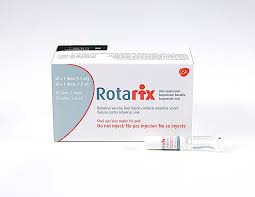AKU researchers study Rotavirus vaccine effectiveness, booster dose power
A second study on increasing the effectiveness of the Rotavirus vaccine in Pakistani children with a booster dose will be undertaken by researchers at AKU’s Department of Paediatrics & Child Health, as the first seven-year study wraps up in October 2023.
Rotavirus causes diarrhea and is the most common cause of severe gastroenteritis in children under 5 years old. In Pakistan, rotavirus causes 5.5 episodes of moderate to severe diarrhea per 100 infant-years, accounting for 23% of all moderate to severe diarrhea in infants in the country.
Caption: (L) AKU's Dr Syed Asad Ali and (R) FDI DG Dr Mohammad Ahmad Kazi at the dissemination session for Parvan's first study in Islamabad on September 20, 2023. Credit: AKU
Because of the tremendous global burden, rotavirus vaccine development and introduction has been a high global priority. In 2006, 2 oral rotavirus vaccines were licensed for use in many countries: 3-dose RotaTeq (Merck and Co, Inc, Whitehouse Station, NJ) (RV5) and 2-dose Rotarix (GlaxoSmithKline Biologicals, Rixensart, Belgium) (RV1).
The Rotavirus vaccine was introduced in Pakistan’s national immunization program EPI in 2017. The government provides it to all infants free of cost along with 10 more vaccines.
Researchers at AKU have been instrumental in
proving the burden of disease through studies, which made a compelling case for the rotavirus vaccine to be included in the EPI.
After the rotavirus vaccine was introduced, AKU decided to set up the Pakistan Rotavirus Vaccine Assessment Network or PARVAN so that research could continue on the vaccine in Pakistan.
Parvan is chaired by Federal Directorate of Immunization DG Dr Mohammad Ahmad Kazi and is co-chaired by AKU’s Dr Syed Asad Ali. Experts from seven leading hospitals in Sindh, Punjab and Khyber Pakhtunkhwa are members of the network.

Parvan’s first study on the rotavirus vaccine started on January 1, 2017 and it ends on October 31, 2023. Now that the seven years are almost up, the team shared the results of Parvan’s first research study with the government on September 20, 2023.
The meeting was held at the EPI Federal Directorate of Immunization in Islamabad. The network then approved the next study at this meeting, which was attended by stakeholders from national and international organisations.
The study has been funded by the Centers for Disease Control and Prevention (CDC). Data has been gathered from hospitals based in Karachi, Lahore, Multan, and Peshawar. The study has been headed by Dr. Syed Asad Ali, Dr. Shazia Sultana, Dr. Tahir Yousafzai and Atif Riaz.
In the first study, the researchers wanted to see how effective the Rotavirus vaccine was after it was included in the national vaccination program. Would hospitalisations attributed to Rotavirus diarrhea among children go down? They found that it was about 30% effective in Pakistani children. (The full results will be available after publication.)
The experts concluded at the Islamabad meeting that given the vast burden of Rotavirus in Pakistan and that the vaccine had shown similar effectiveness in other regional countries, it would still make a significant difference. Of course, the vaccine has shown to have more impact in higher income countries. Children in Pakistan are exposed to more pathogens, and environmental hygiene and sanitation factors, which would explain why the vaccine is comparatively less effective. In lower and middle income countries it is established as under 60% effective in general.
The Parvan stakeholders discussed the way forward. They approved a second study to assess if a booster vaccine dose should be introduced at 6 and 10 weeks. Some reserach studies elsewhere in the world has looked at a booster dose when the child comes in at 9 months for the measles vaccine. If at that point a Rotavirus vaccine booster shot is given, it could be more effective. As it is, as children approach their second birthday their immunity wanes.
The study has been approved by Parvan and the next step will be to secure funding.
Our research
Syed Asad Ali, Abdul Momin Kazi, Margaret M. Cortese, Jessica A. Fleming, Umesh D. Parashar, Baoming Jiang, Monica Malone McNeal, Duncan Steele, Zulfiqar Bhutta, Anita Zaidi,
Impact of Different Dosing Schedules on the Immunogenicity of the Human Rotavirus Vaccine in Infants in Pakistan: A Randomized Trial, The Journal of Infectious Diseases, Volume 210, Issue 11, 1 December 2014, Pages 1772–1779, https://doi.org/10.1093/infdis/jiu335
Romena Qazi, Shazia Sultana, Shiyam Sundar, Haider Warraich, Tayyab un-Nisa, Abida Rais, Anita K.M. Zaidi, Population-based surveillance for severe rotavirus gastroenteritis in children in Karachi, Pakistan, Vaccine, Volume 27, Supplement 5, 2009, Pages F25-F30, https://doi.org/10.1016/j.vaccine.2009.08.064.


